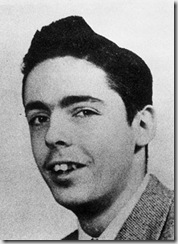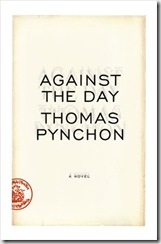Bits & Bytes: Happy Birthday, Thomas Pynchon!
American novelist Thomas Pynchon turned 72 yesterday. Pynchon’s novels include V., The Crying of Lot 49, Gravity’s Rainbow, Vineland, Mason & Dixon, and Against the Day.
My introduction, and lifelong obsession with Pynchon’s work, came in the Summer of 1973. I was a student working a summer job at a small Los Angeles community newspaper. I wrote a few articles, including interviews with injured Vietnam War vets and entertainer George Jessel. But mostly I spent each day selling, or trying to sell, ads by phone.
Based on several reviews, which heralded the book as a masterpiece, I purchased a paperback copy of the recently published Gravity’s Rainbow. Every day I ordered the same lunch at the Astro Burger on Santa Monica Blvd., ate it at a nearby park, and read Pynchon’s novel.
I was hooked from the very first page, but couldn’t make much sense of the plot or characters. It was a new world, beyond the ordinary, beyond the newspaper office, cold calls to indifferent leads, school, family, friends. It was a mad genius guided tour to a world that contained everything – history, physics, math, movies, music, drugs, literature – low comedy and high intelligence. It was a Technicolor nightmare, inviting and foreboding. Well, you get the picture.
It took me pretty much that whole summer to finish the book, taking on the dense prose in small chunks, and spending the rest of the day and night thinking about what I had read, and anticipating the next day’s passage. There was nothing I had ever experienced like Gravity’s Rainbow. And, 36 years later, I can still say the same thing.
The Bits & Bytes guidelines call for including an excerpt with at least some technical content. Pynchon was an engineering student at Cornell, a technical writer at Boeing, and is a true polymath. Finding technical content in a Pynchon novel is no more difficult than finding water in a Jacques Cousteau documentary.
The challenge is what to pick. Since I’m currently reading (actually listening to) Pynchon’s latest novel, Against the Day, let’s go with that.
This section from pp. 796-97 of the paperback edition describes the aftermath of the mysterious Tunguska Event of 1908. It’s very much pure Pynchon in the mixing of actual history and science with the speculative and spiritual (hint: Nicola Tesla and his Death Ray might have had something to do with it):
Whatever had happened out there provided its own annunciation, beginning upriver from Vanavara and booming westward at six hundred miles per hour, all through that darkless night, one seismograph station to the next, across Europe to the Atlantic, via posts, pendulums, universal joints, slender glass threads writing on smoked paper rolls driven clockwork-slow beneath, via needles of light on coatings of bromide of silver, there was the evidence… in distant cities to the west, “sensitive flames,” some of them human, dipped, curtseyed, feebly quivered at all-but-erotic edges of extinction. Questions arose as to the timing, the “simultaneousness” of it. New converts to Special Relativity took a fascinated look. Given the inertia of writing-points and mirrors, the transit times at focusing lenses, the small variations in the speed at which the bromide paper might have been driven, the error of the seismograph recordings more than embraced the “instant” in which a hitherto-unimagined quantity of energy had entered the equations of history.
“Power being equal to the area under the curve,” as it seemed to Professor Heino Vanderjuice, “the shorter the ‘instant,’ the greater the amplitude—it begins to look like a singularity.”
Others were less restrained. Was it Tchernobyl, the star of Revelation? An unprecedented harrowing of the steppe by cavalry in untold millions, flooding westward in a simultaneous advance? German artillery of a secret design more powerful by orders of magnitude than any military intelligence office had ever suspected? Or something which had not quite happened yet, so overflowing the tidy frames of reference available to Europe that it had only seemed to occur in the present, though really originating in the future? Was it, to be blunt, the general war which Europe this summer and autumn would stand at the threshold of, collapsed into a single event?

